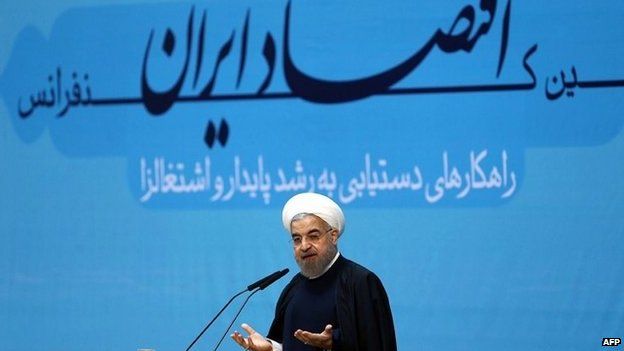Iranian President Rouhani's referendum warning to hardliners
- Published

Shortly before another round of nuclear talks with six world powers begins in Geneva, Iran's President Hassan Rouhani has floated the idea of a referendum on "crucial, disputed matters".
He did not specify what exactly he wanted to put to a vote, but his words show that the stakes are rising in the Iranian political arena as the country gets closer to a possible deal to end the long-running dispute over its nuclear programme.
From poetry to politics, mystery is in the Iranian blood.
Persian poems describing the spirit of wine and the beauty of women, so vague in wording, could easily be interpreted - as some scholars do - as mystical illustrations of love for God.
The Iranian president has offered the latest example of such opacity, in prose.
Talking to hundreds of Iranian economists and business leaders at a conference on Sunday, Mr Rouhani asked for an end to Iran's isolation in the world, harshly criticised those who opposed the nuclear negotiations - and said he might start putting important issues to referendums.
"By God, by Lord, it is impossible: the country cannot have sustained [economic] growth when isolated," he told a congregation that applauded his words, businessmen who have suffered significantly under international sanctions.
"Our ideals are not bound to centrifuges," he added, referring to the ongoing debate on the scale and scope of Iran's uranium enrichment programme. "Negotiations are about bridging interests."
The so-called P5+1 - the United States, Russia, China, United Kingdom and France plus Germany - wants Iran to limit its nuclear capability in return for lifting the sanctions that have caused the Iranian economy to shrink.
The sanctions have wiped more than half of Iran's oil exports off the international market, restricted its access to hard currency and limited its trade in goods and technology.
The current global slump in the price of oil is compounding Iran's economic problems, for which Mr Rouhani said he was seeking new and innovative solutions.
'Just for once'
The president noted that under the constitution, Iranians were entitled to have important economic, social, political and cultural issues put to a referendum instead of having parliament decide.
"On a crucial matter that affects all of us and our livelihoods, let's ask people's opinion directly, just for once," he said, without mentioning the subject of the proposed vote.
Iran has held three referendums since the revolution - the first in March 1979 approved the creation of the Islamic Republic; the second in December 1979 ratified the country's new constitution; and the third in 1989 amended the constitution following Ayatollah Khomeini's death.
Several Iranian politicians, including Mr Rouhani himself, have in the past called for referendums to be held on various issues, in line with the constitution, but to no avail.
The president has said that in 2004, while he headed the Supreme National Security Council and was leading Iran's negotiations with Western powers, he suggested putting the nuclear programme to public vote. Such an idea was not made public at the time.
'Impractical propaganda'
"Any compromise on the nuclear issue will be attacked by hardliners. Perhaps Rouhani wants to put the terms of a possible deal to a public vote, in order to make opposing it difficult," says Shahir Shahid-Saless, an Iranian political analyst.
"But the truth is that the nuclear issue has turned into a national security matter for which billions have been spent. It is already beyond and above a referendum."
Iran's Supreme Leader, Ayatollah Ali Khamenei, has so far managed to keep almost all factions in line by publicly supporting the negotiating team.
But hardliners close to the powerful Revolutionary Guards and former President Mahmoud Ahmadinejad have been nervous about the prospects of a nuclear deal, as well as the possibility of a rapprochement with the US and a rise in Mr Rouhani's popularity.
Some analysts think Mr Rouhani's mysterious suggestion is nothing more than a political tactic to put pressure on his rivals.
"Calling for a referendum is impractical propaganda used as leverage in infighting between factions," says Mehdi Khalaji, a senior fellow at the Washington Institute for Near East Policy. "A referendum needs freedom of speech for those both in favour and against."
Flexing muscles
Iranian hardliners were quick in pointing out to the president that even the road to a referendum passes through conservative-dominated institutions.
Hossein Shariatmadari, the editor of hardline newspaper Kayhan, told the Fars news agency that Mr Rouhani seemed to have forgotten that proposals for referendums had to be approved by two-thirds of MPs.
The president may never officially propose a referendum, but he is clearly flexing his muscles - warning the hardliners that he could resort to popular vote to counter their objections to a potential nuclear deal before the deadline of 30 June.
Alternatively, if Mr Rouhani does propose a referendum and they prevent it being held, the hardliners will be framed as opponents of the popular will.
The last, but least likely, scenario is that the Islamic Republic's leaders are reluctantly heading to a compromise with the West and want to save face by shifting the "blame" on to a public vote. However, there are very few other signs supporting this assumption.